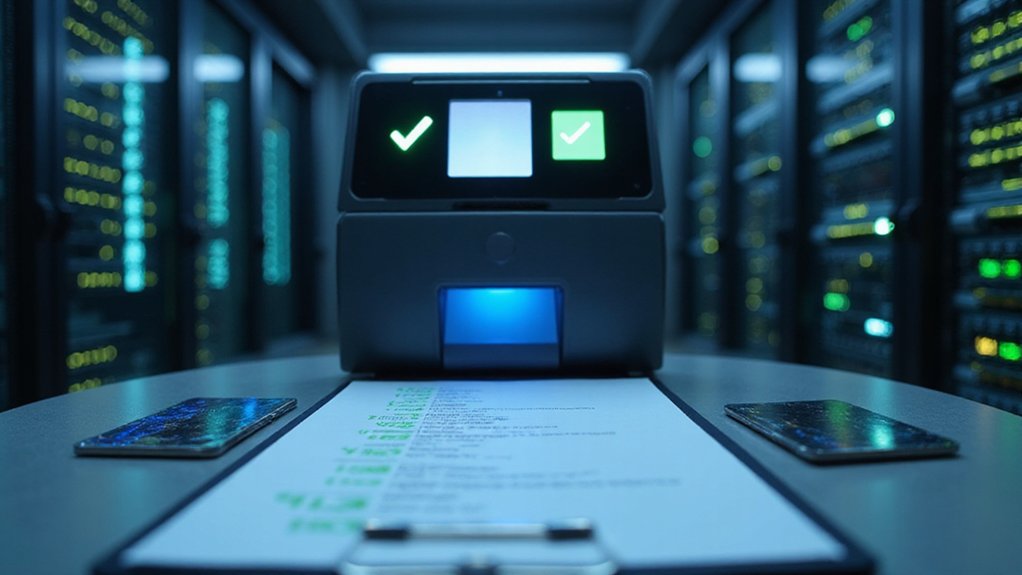Crypto wallets, far from actual billfolds, function as authentication tools for blockchain access—existing in hot (online) and cold (offline) varieties. Hot options like MetaMask facilitate frequent transactions but invite security risks, while cold solutions such as Ledger devices prioritize protection through air-gapped security. Selection hinges on one’s tolerance for the convenience-security trade-off, with prudent investors often deploying both types strategically. The crypto-curious will discover which configuration best suits their particular risk appetite.

The labyrinthine world of cryptocurrency storage—a domain where digital assets worth billions float in the ether, protected by nothing more substantial than strings of cryptographic code—demands sophisticated solutions that balance security with accessibility.
These solutions manifest as crypto wallets, which come in three principal varieties: hardware, software, and paper, each further categorized as either “hot” (internet-connected) or “cold” (offline).
Hot wallets—perpetually connected to the internet—serve users requiring frequent transaction capabilities. Experts recommend only keeping a small percentage of funds in hot wallets due to their inherent security risks.
Hot wallets maintain continuous internet connectivity, catering to cryptocurrency users who demand constant transaction functionality and accessibility.
Software implementations like MetaMask and Coinbase Wallet exemplify this category, offering convenience through multi-platform access and biometric authentication.
The trade-off? Persistent internet exposure renders them more vulnerable to security breaches (though multi-factor authentication mitigates some risk).
For the security-conscious investor (particularly those with substantial holdings), cold wallets present a compelling alternative.
These offline solutions—typically hardware devices resembling USB drives or physical paper documents—substantially reduce hacking vulnerabilities by keeping private keys quarantined from internet connections.
The Ledger and Trezor product lines have emerged as market leaders in this space, offering integration with popular software wallets for enhanced functionality.
Hardware wallets provide enhanced protection by ensuring private keys never leave the device during transaction signing processes.
Popular software options like Exodus impress with their extensive cryptocurrency support (280+ assets) and intuitive interfaces featuring live market data and staking capabilities.
MetaMask, while more narrowly focused on Ethereum-compatible blockchains, benefits from open-source transparency and regular security patches.
Coinbase Wallet offers remarkable versatility across exchanges and decentralized finance applications.
The astute crypto participant must ultimately evaluate several factors when selecting a wallet: security rating (encompassing encryption methods and authentication protocols), asset compatibility, and the ever-present tension between convenience and protection.
Open-source wallets provide the advantage of community scrutiny, while hardware solutions offer superior security at the cost of transaction immediacy.
In this rapidly evolving landscape where fortunes can vanish with a single compromised key, the selection of an appropriate wallet represents not merely a technical choice but a fundamental risk management decision.
Regardless of wallet type, users should remember that cryptocurrencies exist purely as data on the blockchain, with wallets simply providing access to these records.
Frequently Asked Questions
What Happens if I Forget My Wallet’s Private Key?
Forgetting a private key typically results in permanent loss of crypto assets—a financial calamity not easily remedied.
Without this cryptographic passport, one’s digital wealth becomes frustratingly inaccessible, locked behind an impenetrable mathematical fortress.
While some wallets offer recovery mechanisms through seed phrases, many unfortunate investors have witnessed their holdings transform into digital ghosts—permanently visible on the blockchain yet utterly unretrievable.
Regular backups remain the only reliable safeguard against this particular brand of financial oblivion.
Can One Crypto Wallet Store Different Types of Cryptocurrencies?
Yes, many modern crypto wallets support multiple cryptocurrencies simultaneously.
These “multi-currency” wallets—whether hardware solutions like Ledger or software options such as Exodus—allow users to manage diverse digital assets under a single interface.
This consolidation offers considerable convenience (who needs dozens of separate applications?), though it does concentrate security risk.
The technical architecture enables distinct address generation and transaction management across various blockchain protocols, while providing unified portfolio tracking—a remarkable feat of financial technology integration.
How Vulnerable Are Hardware Wallets to Physical Damage?
Hardware wallets are remarkably vulnerable to physical damage—from drops to water exposure to electrical surges.
When damaged, they may permanently lose stored private keys, rendering crypto assets inaccessible unless proper backups exist.
The secure elements within these devices are particularly susceptible to physical impact.
While manufacturers implement tamper-evident seals and self-destruct mechanisms against intentional breaches, they offer little protection against accidental damage.
Hence the crypto adage: your recovery seed phrase is far more valuable than the device itself.
Are Transaction Fees Different Across Various Wallet Types?
Transaction fees aren’t determined by wallet types themselves but rather by the underlying blockchain networks they operate on.
While a Bitcoin transaction costs the same whether initiated from a hardware, mobile, or desktop wallet, fees do vary based on several factors: network congestion, transaction complexity (simple transfers versus smart contract interactions), and whether the wallet provider adds supplementary service charges.
Some wallet ecosystems offer internal transfers at reduced rates—a minor consolation in the otherwise democratically expensive world of blockchain fees.
Can Wallet Addresses Be Traced Back to Personal Identities?
Wallet addresses can indeed be traced to personal identities, despite their pseudonymous design.
When cryptocurrency transactions intersect with regulated exchanges requiring KYC verification, the veil of anonymity thins considerably.
Forensic firms employ sophisticated clustering algorithms to group related addresses, while OSINT techniques harvest identity breadcrumbs scattered across the digital landscape.
Though privacy technologies (mixers, CoinJoin, etc.) complicate matters, determined investigators—particularly those with subpoena power—can frequently connect blockchain dots to flesh-and-blood individuals.









